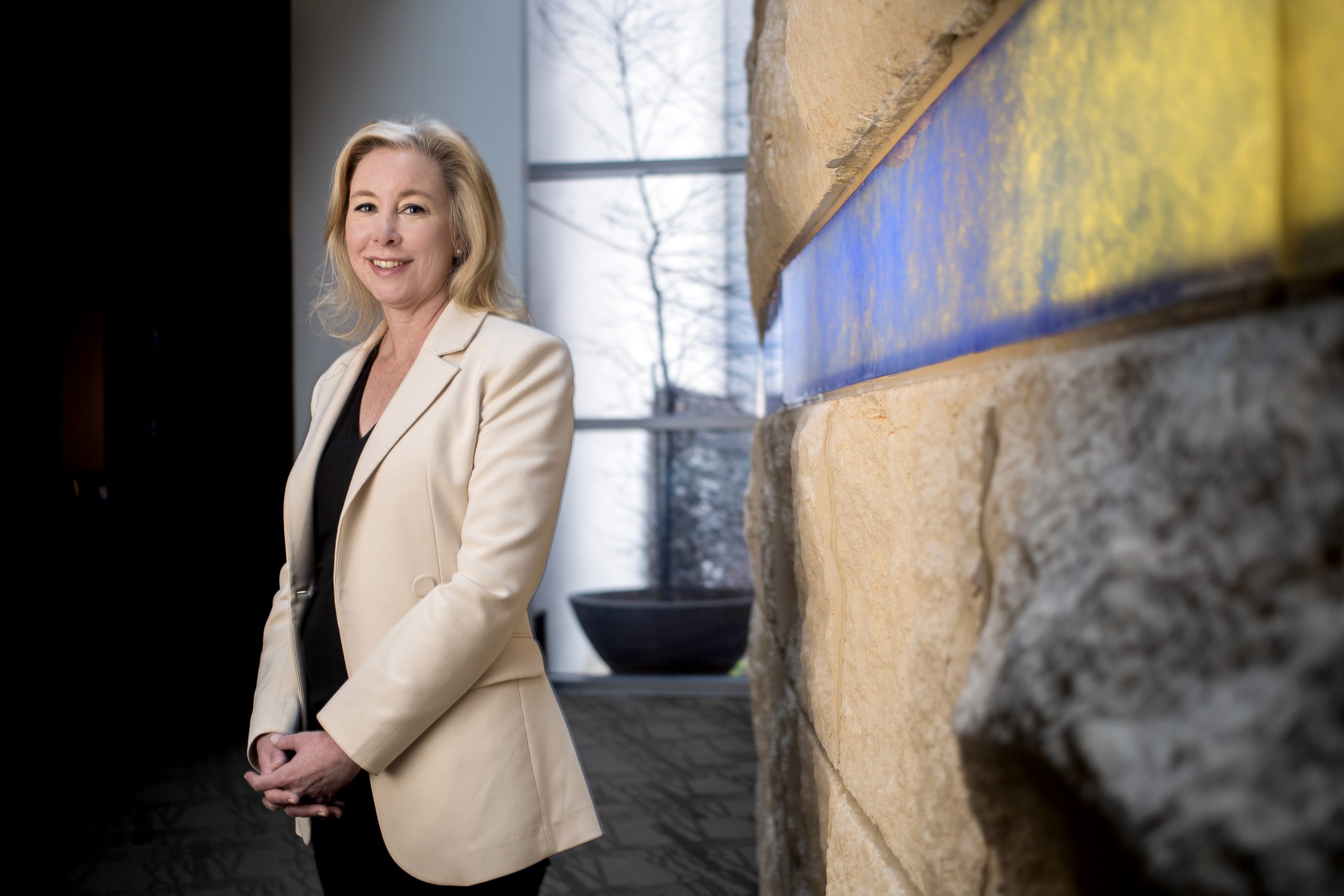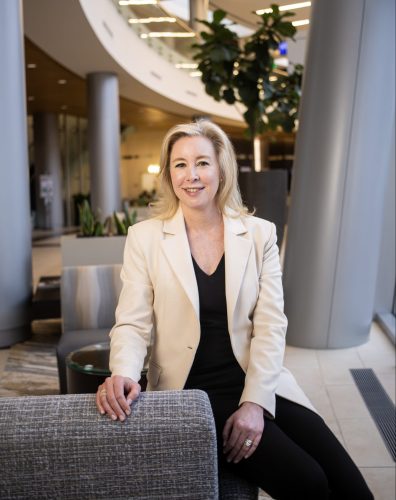When Life ‘Changes in an Instant’
Resiliency is key to coping, trauma expert Ann Marie Warren says.

Ann Marie Warren is the co-director for the Trauma Research Consortium at the Baylor Scott & White Research Institute in Dallas. Photo by Mark Graham
When Life ‘Changes in an Instant’
Resiliency is key to coping, trauma expert Ann Marie Warren says.
Despite our best efforts, bad things do happen. Learning why individuals respond the way they do fascinates Ann Marie Warren ’93, who studied psychology as an undergraduate at TCU.
“Both clinically and in research, I’m interested in how people are affected by unusual, difficult or traumatic events,” said Warren, who went on to earn her master’s in mental health counseling at Nova Southeastern University and her PhD in clinical health psychology from the University of North Texas. “Many times psychologists look at depression, PTSD or anxiety disorders, but I’m also interested in the positive side — resilience.”
The American Psychological Association defines trauma as “an emotional response to a terrible event like an accident, rape or natural disaster.” Paula Schnurr, executive director of the National Center for PTSD, told The New York Times in an April 2022 story that 70 percent of adults in the U.S. have experienced at least one traumatic event.
Some experiences are more life-altering than others, Warren said. She began her career as a clinical psychologist working with patients who had experienced spinal cord injury.
“These individuals go through things that are just unimaginable — sometimes total paralysis,” she said. Some people cope and get through it while others just don’t do as well, Warren noticed. The ability to cope is innate in some individuals, she said, and can be strengthened in others with proper support.
Warren, a licensed psychologist and board-certified rehabilitation psychologist, today serves as research center co-director for the Trauma Research Consortium at the Baylor Scott & White Research Institute in Dallas.
“Ann Marie has superior intellect, and she’s competent and accomplished,” said Mark Powers, who serves as research center co-director alongside Warren and Suzy Gulliver. “But simultaneously she has kindness. She exudes all of those qualities with everyone — superiors, colleagues and patients.”
Powers called Warren, with her dual role, “a true scientist-practitioner.”
“She conducts research and also is a clinician and licensed psychologist,” he said. “She enjoys helping an individual and also relishes how our efforts in research may potentially impact lots of people through our findings.”

“Life can change in an instant — I’ve learned that and I’ve seen that, and that makes me more grateful every day,” trauma expert Ann Marie Warren said. Photo by Mark Graham
Warren is the principal investigator of several funded research projects and multisite collaborations pertaining to the psychological aspects of physical injury, including depression, post-traumatic stress disorders and resilience. Her role includes writing grants and research manuscripts, providing oversight for research projects, and, in clinical settings, conducting psychological evaluation and intervention for some study participants.
Three decades ago at TCU, Warren was just beginning her training. An October 1991 article in the Daily Skiff quoted Warren, then an undergraduate, about her participation in a peer-to-peer counseling program led by psychology professor Lisa Rollins-Garcia. “It’s really made me deal better with people in general,” Warren was quoted as saying about the program.
Warren laughs at the front-page thoughts from her younger self but expresses gratitude for the counseling program that she said taught her important skills. “I give TCU the credit for my comfort level for a foundational understanding of psychology and for my comfort level with public speaking,” she said.
Warren said that the individuals and families she has worked with over the years have taught her much about life and have helped to form her perspective on it.
“Life can change in an instant — I’ve learned that and I’ve seen that, and that makes me more grateful every day,” she said. “It’s not just the idea that life is short, but the concept that bad things do happen. And no matter what happens, there are ways that people can adapt and cope. That is resiliency.”
In addition to those with spinal cord injury, Warren has worked with people who lost limbs, women born without a uterus who undergo transplantation to carry a child and patients who have been hospitalized in intensive care, among others.
“The most successful types of people are those who are creative, adaptable and flexible. I often say to patients, ‘Change isn’t necessarily bad or good. It’s what we do with it that matters.’ ”
Ann Marie Warren '93
In 2021, Baylor Scott & White was recognized by the National Institute on Disability, Independent Living and Rehabilitation Research as a Model System Center for the treatment of spinal cord injury, adding to recognition the system had already received for treatment of traumatic brain injury.
As one of two principal investigators for a five-year grant funded by the institute, Warren leads a team of Baylor Scott & White researchers testing new interventions to help reduce the potential mental health impacts of surviving a spinal cord injury. The team’s hope is to study strategies that may preclude outcomes like post-traumatic stress disorder for individuals facing challenging circumstances.
Whether it’s a traumatic event, a pandemic or everyday life, resiliency is a key to surviving and even thriving in the face of adversity, Warren said.
“The most successful types of people are those who are creative, adaptable and flexible,” she said. “I often say to patients, ‘Change isn’t necessarily bad or good. It’s what we do with it that matters.’ ”
Warren shared lessons she has learned about resilience:
While some people are more adept at handling change than others, we all can become more resilient. Techniques to help you bolster resilience are finding a source of social support, expressing your feelings and participating in meaningful activities — all good self-care strategies.
Ask for help. It’s important to ask for help when you need it. Let people know how you feel. Tell someone if you’re not OK. If you ignore it and keep it inside, it’s not necessarily going to go away.
Get into a new head space. Visit somewhere new, try an activity you haven’t done before or pursue an interest — something that allows you to just be in the moment. For some people, it’s exercise; for me, it’s fishing. I can literally fish for hours and just enjoy the mental relaxation.
Appreciate adversity. Going through difficult circumstances helps us learn the tools to cope. What doesn’t kill us truly does make us stronger.
Reframe your perspective. Through cognitive restructuring, we can teach people how to look at an event that has happened and realize that there are ways to cope. Learn to monitor your thoughts and recognize patterns or assumptions that may hold you back; work with a therapist to learn more about challenging and changing unhelpful thoughts.
Understand and command your level of control. In research, we see that resilience is highly correlated with spirituality, attitude and optimism. There are areas where people have control and areas we don’t. In your own sphere of influence, ask yourself, “How can I take care of the ones close to me?” Then recognize situations beyond your grasp and cede their outcomes to a power larger than yourself.
Know you are resilient. There’s increasing amounts of research on building resilience, but most data show we are born with the capability to be resilient. Recognize it and roll with it.

Your comments are welcome
Comments
Related reading:
Campus News: Alma Matters, Research + Discovery
Brenton Cooper’s Research on Vocal Learning
The psychology professor studies how songbirds develop the ability to make sounds, and his results could benefit humans.